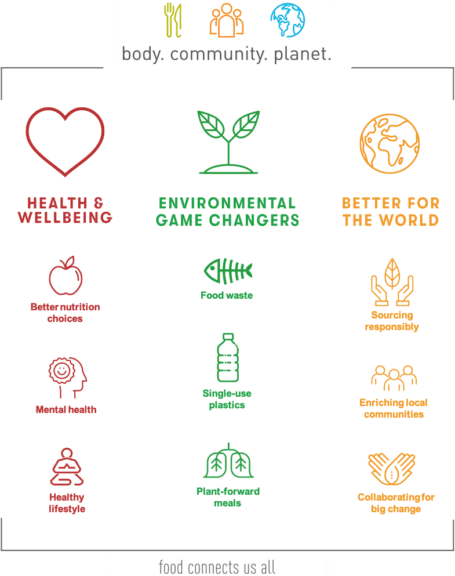At Compass, we have made it our mission to create a significant, meaningful, and positive impact on the environment. The actions we take at both a broader organizational and a unit level, all contribute to the larger global objective of making a real difference. This is a clear priority, not only for Compass, but for our clients and guests as well. Our actions contribute to a more sustainable food supply; supporting the health of our guests and that of our planet.
Knowing where our business can have the biggest impact and taking account of what matters most to our stakeholders, alongside industry trends, is important to us. Despite the new challenges presented by COVID-19, we continue to uphold our environmental and social commitments whilst working hard to keep our people and our consumers safe. Underpinned by the topics of Safety and People, our sustainability strategy focuses on three key pillars:
Health and wellbeing
Staying healthy in both mind and body has been particularly important this year. We continue to focus on providing better nutritional choices and supporting mental health and wellbeing.
Environmental Game Changers
We are taking action to address our impact on the planet, including reducing food waste, problematic single use plastic packaging, and increasing plant-based options in our menus.
Better for the World
We are creating more resilience in our supply chain, focusing on responsible and sustainable sourcing, enriching local communities in which we operate, and collaborating with external partners to maximize our positive impact.
Our three top priorities are those in which we know we can make the greatest impact.
We’ve shared some specific examples of our commitment in action, below.
Food is our business, and our passion. Every step, from the ingredients we order to how we serve and present our food, is through the lens of managing its waste. We work with suppliers to ensure we have the right sizes and volumes of ingredients at the right time for the freshest and most delicious results.
Our most impactful action incorporates waste reduction strategies into a menu and production planning program that includes proper forecasting, culinary techniques, kitchen processes and use of leftovers in a way that ensure we simply are not wasting food.
In addition to Food Waste reduction, as an organization, we are also committed to supporting Canada’s plan to eliminate problematic single-use plastic packaging.
Presently, we:
- Offer compostable paper straws, and stirrers.
- Offer compostable and reusable cutlery.
- Have a variety of compostable food container options.
- Do not sell beverage pack sizes containing six-pack rings
Our Corporate responsible sourcing commitments relate to the categories in which we know we can make the greatest impact, and where we know supply chains require a shift to become more sustainable. These commitments are:
- 100% free-run/cage-free shell and liquid eggs by 2025
- We are working with our suppliers to transition the supply chain, and are on track to do so by our stated target
- 100% certified sustainable palm oil by 2022
- 100% GAP standards for broiler chickens by 2026
- We are working with our suppliers to increase the procurement of Global Animal Partnership (GAP) certified chicken, and the adoption of higher welfare practices within the industry. Our suppliers are continually improving and transitioning to best practices, abiding by regulatory standards as defined by the Canadian Food Inspection Agency, and industry guidelines in cooperation with industry associations, such as Chicken Farmers of Canada, and third-party certifications, such as GAP.
- Maintain a minimum of 50% certified sustainable seafood
- Sustainable seafood can be defined as species that are caught or farmed in a way that ensures the long-term health and stability of that species, as well as the greater marine ecosystem. (source: Ocean Wise Seafood Program)
- As part of our commitment to source and menu sustainably caught and harvested seafood, we have recently partnered with the Global Sustainable Seafood Initiative (GSSI) which brings much needed clarity around the various global certification schemes and their equivalence, enabling consistent and lasting positive impact for the industry, both environmentally and socially.
We continue to focus on improving our sustainability and responsibility when it comes to our sourcing efforts. While the above shares what we are currently focused on as an organization, it is not inclusive of all actions underway to support a healthier supply chain.
We know the global food supply chain represents 33% of greenhouse gas (GHG) emissions of which agricultural production, transportation, kitchen facility energy usage, and landfill-related food and packaging waste are key contributors. By focusing our attention on these aspects, whether increasing our plant forward options, or ensuring our Chefs use root to stem culinary practices we are looking at where we can reduce our emissions.
These commitments are supported by our FoodBuy purchasing team enabling our Chefs to select sustainable ingredients and products as default when submitting food supply orders.
While we work toward the above supply chain goals, our Menus of Change (MOC) philosophy puts more plant-forward meals as center of plate. This is how we increase the amount of delicious, healthy, and sustainable foods on our menus where meat moves to the side of the plate, letting produce and grains take centre stage.